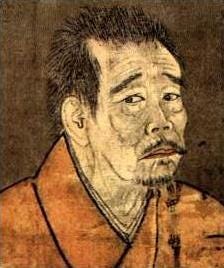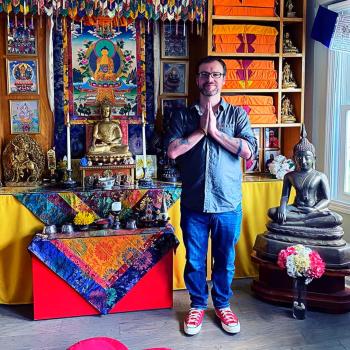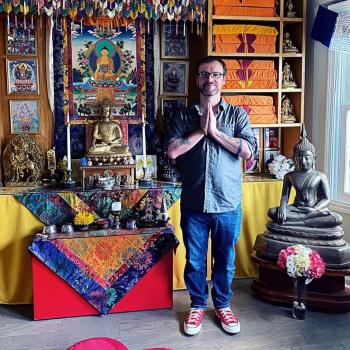“Practicing impermanence has the immediate benefits of bringing greater joy and appreciation to our lives. Even more beneficial than that, it spurs us on to liberation. The time to start using our human potential is now.” -Khentrul Lodro Thaye
If you want to listen to a podcast on this subject, click here; Impermanence

Nothing in this world lasts. We know this, but we are also sometimes committed to not understanding it. We fixate on things and wish for them to last. In itself, that may not be bad, except for the obvious disappointment that will come. But also at times it can make us really unhappy when we’re reminded of impermanence. The gray in my beard and the growing up of my children before my eyes are constant reminders of impermanence. You probably have some constant reminders too. And if you don’t, you will soon.
What does impermanence mean?
He says something that has permanence is: “Never changing, that something or someone by it’s very nature is constant and stays the same. If something or someone is permanent, there can be no moment-to-moment change and no end.”
And something that’s impermanent is: “Constantly changing or never the same. Change happens every single moment….There isn’t a single moment when we’re not changing. Nothing and no one is ever the same moment to moment.”
We don’t want to face this sometimes, of course. Unpredictability can easily give us anxiety and discomfort. And the elephant in the room is that also we’re going to die. We don’t know when or how, but we’re going to die. Everyone is. We prefer not to think about that most of the time. But maybe we should think about it. Maybe thinking about it can be, in some measure, helpful to us. When you are reminded that you’re going to die, maybe you’ll make more careful decisions about how you’re going to live your life.
Back when I was in college 20 years ago (impermanence again, I can’t believe it was 20 years ago) I worked full time. So I had a full class schedule and 40 hours a week at a terrible job. When I was doing that I had very little free time, so I tried to be picky about how I used my time. I didn’t want to waste the small amount of free time that I had.
We don’t have much time. So maybe we should be a little more picky about how we spend our time. Don’t waste your life. It has an expiration date. And it could come at any time.
Zen Master Ikkyu said, “Like vanishing dew, a passing apparition or the sudden flash of lightning – already gone – thus should one regard one’s self.”

That’s not how we regard ourselves, of course. But it’s something we can aspire to cultivate. The bottom line is I don’t want to find out I have a terminal illness and then just cry and weep and lament my condition until I die. I want a calm acceptance of my situation. Mind training can help us do that. We can learn to pass from this world in a more mindful, calm, and self compassionate way.
Impermanence is sometimes put into two categories, perceptible and imperceptible. Perceptible impermanence is the obvious changes that occur. This includes things like the gray in my beard, falling leaves at the start of fall, and the tires in my car wearing out and going flat. Imperceptible impermanence is the more subtle version. My car tire didn’t become impermanent the moment the treads wore out and it got a small leak and started to flatten. It was impermanent the whole time. My beard didn’t suddenly turn gray overnight, signaling impermanence to me. It very slowly did, hair by hair. My dad didn’t become impermanent the moment he was diagnosed with cancer. He didn’t even suddenly get cancer the moment he was diagnosed with it. It was already there. So when we say impermanence is always present, that doesn’t mean it’s always very clear. Impermanence is always already there.
So, that all sounds very depressing.
But impermanence can be inspiring too.
Khentrul Lodro Thaye says; “Contemplating impermanence brings our perception into harmony with the way things are, which refines and tames the mind. The closer our perception is to how things actually are, the less we suffer because we no longer have the expectation that things should be lasting… When we clearly determine that there is nothing lasting to be found in life, we are inspired to search for what is ultimately true and reliable. We search for what won’t fail us. Understanding impermanence ignites a desire within us to a practice that will lead to truth.”
Lying to ourselves about impermanence doesn’t serve us. Pretending things will last forever only makes us unhappy. In general I think lying to ourselves doesn’t serve us in a lot of ways. And this path calls us to be genuine and honest with ourselves. Once you’ve done some mind training, you’ll come to realize that you can’t deceive yourself as sincerely as you did before. We’re learning to see through our stuff and to not let ourselves get away with so much. This is a good thing.
Seeing reality as it is can be empowering.
Impermanence can motivate and inspire us. It makes us not want to waste our precious human lives. We sometimes carry around expectations of permanence and those really get in our way. I differentiate between expecting things to be permanent and wishing they will. Expectations are how we hurt our own feelings. If we have a healthy and honest sense of change, that prepares us for when changes come. We can deal with what life throws at us a little better when we don’t have unrealistic expectations. When we know things change we don’t resist it quite so aggressively. We can relate to the world around us in a way that’s less painful to us.
Awareness of impermanence helps us in our relationships too. It reminds us not to take people for granted. We can get caught up in our self obsession and take our loved ones for granted easily. Sometimes we must remind ourselves that they won’t be around forever.
There’s a teaching that Khentrul Lodro Thaye calls ‘The Four Endings of Impermanence.’ I’ve seen this teaching called ‘The Four Conditions of Existence’ and that makes a little more sense to me. But I’m not going to question Khentrul Lodro Thaye’s terminology. Just know that if “Endings” sounds weird to you, it sounds weird to me too.
Here they are:
The Four Endings of Impermanence:
1) All birth ends in death
2) What goes up ends up coming down
3) All that is accumulated ends in exhaustion
4) All gathering ends in separation
This is not really new information. But the point is: it’s not just you. If you think you’re going to last, you’re wrong. If you think you can build something that will last, you’re wrong. If you think you can accumulate things that will last, you’re wrong. If you think you can join something that will last, you’re wrong.
I see this as a sort of tough love teaching. Once we accept that we’re impermanent, we may be tempted to try to place permanence on something else. I want to build something that’s going to outlive me. Maybe I can create something that will outlive me. But it still won’t last in the greater scheme of things.
So, I want to encourage you to do this:
Whenever something is bothering you, whenever you’re upset or annoyed or lamenting a situation, take a deep breath and remind yourself: this is impermanent. This will pass.
One night I slept wrong on my bed and woke up and my back was sore. That’s impermanence again. Such things did not happen when I was in my 20s and 30s. If you’re in your 40s or older, you probably understand. I was sore enough to be uncomfortable, but not so sore that I couldn’t move through my day to day life. I had to remind myself, “Back pain has always gone away before. This will go away.” After I reminded myself of that, I wasn’t quite so miserable. Also, it seemed like my back was a little less sore once I reminded myself that this wasn’t a new state of being for me.
Right now it’s like this, what can I do?
====================================================================
Click the bowl for a guided meditation:














